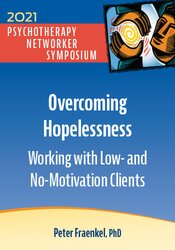Overcoming Hopelessness: Working with Low- and No-Motivation Clients
$119.99 Original price was: $119.99.$39.00Current price is: $39.00.
One of the greatest challenges a therapist can face is when a client feels hopeless about the possibility of change. But whether this sense is due to doubts about therapy or the intransigent nature of their struggles, current research challenges the widespread assumption that clients must be strongly motivated in order to change. The Creative Relational Movement (CRM) approach is a set of ideas and practices that stimulate clients to engage in therapy, even when their motivation is low. You’ll discover:
- How to apply the five principles of CRM with “last chance” couples as well as with clients suffering from depression, anxiety, and substance abuse
- How to use the integrative Therapeutic Palette approach to help clients engage in their treatment, even when they may not see the point
- Specific mindfulness practices that facilitate immediate psychophysiological change
- How to offer “experiments in possibility,” even if they feel unnatural or even irrational at first
Peter Fraenkel, PhDRelated seminars and products
Peter Fraenkel, PhD, is a psychologist, associate professor of psychology at the City College of New York, and former director of the Center for Work and Family at the Ackerman Institute. He received the 2012 American Family Therapy Award for Innovative Contribution to Family Therapy.
Speaker Disclosures:
Financial: Dr. Peter Fraenkel maintains a private practice and has an employment relationship with The City College of New York. He receives royalties as a published author. He receives a speaking honorarium and recording royalties from PESI, Inc. He has no relevant financial relationships with ineligible organizations.
Non-financial: Dr. Peter Fraenkel is a member of the American Psychological Association (APA), the American Family Therapy Academy (AFTA), National Council on Family Relations (NCFR), Council on Contemporary Families (CCF), American Professional Society on the Abuse of Children (APSAC), New York State Psychological Association (NYSPA), Society for the Exploration of Psychotherapy Integration (SEPI), and the Royal Society of Medicine.










